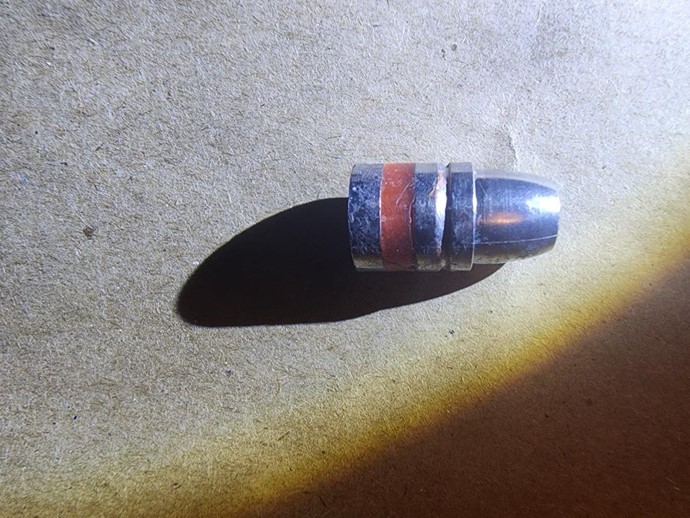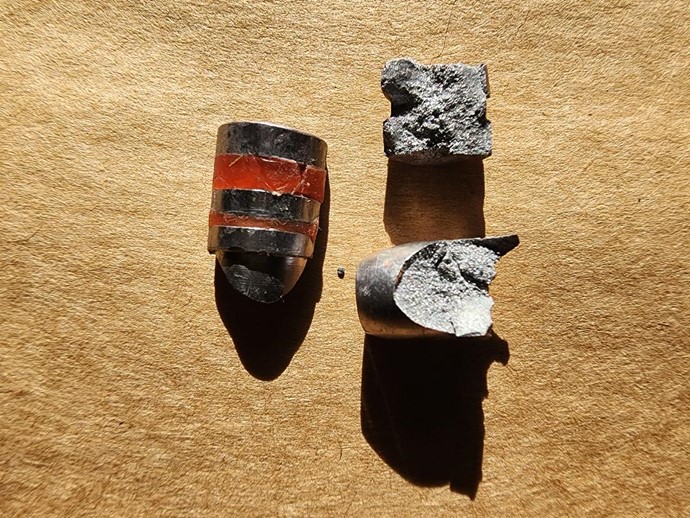Hello: I made up some .44 bullets using lyman no.2 alloy mix. I was told dropping them in water out of the mold would make them harder.
 As a test I hit one on a piece of steel with a hammer. The bullet shattered. Will these still be safe to use? Can they be used in an indoor range safely? Or would they be OK to fire into a dirt berm at an outdoor range? In the past when hit with a hammer my cast bullets just deformed but held together. Thanks for any help on this, mike
As a test I hit one on a piece of steel with a hammer. The bullet shattered. Will these still be safe to use? Can they be used in an indoor range safely? Or would they be OK to fire into a dirt berm at an outdoor range? In the past when hit with a hammer my cast bullets just deformed but held together. Thanks for any help on this, mike
question on cast bullet
- 417 Views
- Last Post 26 November 2022
- Topic Is Solved
Attached Files
A minor footnote. I had several custom molds made for my ,41. I always had them made with a gas check. However, after seeing the Plain Base Bullet CBA match guys shoot their bullets up to 1,400 fps mv, and reading in recent years about the merits or lack of, of using gas checks on revolver bullets, I’ve changed my outlook. I have NO revolver loads going 1,400 fps. I’m lucky to get to 1,200 fps, most of the time slower. So now, all of revolver loads are plain base, no gas check.
Tom
Attached Files
I do use these in a revolver. Thank you for the information and your time.
Attached Files
There is true "heat treating" and there is "quench annealing", which involve the same process but are not quite the same thing.
See Fouling Shot articles:
Quench - annealing #53-27, 57-24, 58-9, 79-4, 92-11, 101-3, 133-16, 144-20
Heat treating #22-9, 29-2, 31-8, 33-3, 37-3, 37-5, 37-19, 39-11, 55-3, 62-16, 63-2, 79-4, 142-15, 144-20, 169-14, 182-3, 199-5,
An alloy of COWW plus 1% tin, then heat treated, should be more than plenty hard enough for you. If COWW is unavailable, then you could make your own with 1.5% tin, 2% antimony, 2/10 % arsenic, and 96.3% lead. Lawrence magnum shot is an arsenic rich alloy which can be blended to make heat treatable alloys.
My recollection is that Lyman #2 is more tin than needed.
A COWW + tin alloy can be heat treated to a harder brinnel than Linotype yet still be ductile enough to not shatter. Keep in mind that an alloy of 2:1 or greater of antimony to tin will age harden over time, and an alloy of more tin than antimony will either stay the same or slightly soften over time.
You can quench anneal for pistol bullets if your alloy and mould temp are steady and you have a regular casting rhythm. For accuracy in rifles I would recommend oven heat treating.
AND, you would probably be better off making sure your bullets fit the throats, use gas checks, and COWW with an additional 1% of both antimony and tin than a super hard bullet in a magnum revolver.
Attached Files
Are you shooting these out if a revolver? After years of hardening wheel weight alloy bullets for my revolvers, I discovered, after some testing, that softer bullets gave better accuracy from my two revolvers. One is a S&W .41 Mag. and the other a S&W .45 Auto Rim. If hardening is important, dropping from the mold into a bucket of cold water is inconsistent, tied mainly to the timing of the drop. Better results develop with oven treatment of an entire batch of bullets and quenching them all together into cold water in the sink right next to the oven. This is more consistent and usually produces a harder bullet surface.
Tom
Attached Files
Can I ask what your motivation for hardening No. 2 alloy is?
Cheers from New Zealand
Attached Files
Without any arsenic in the alloy, you are not heat treating the bullets with any effect. Lyman #2 alloy has no arsenic. This method of hardening alloy (quenching) was used to harden WW metal which did contain arsenic.
http://www.lasc.us/HeatTreat.htm
You bullets will shoot fine. They are however extremely brittle. Lyman #2 is hard enough for 44 Mag pressure/velocity. No need for a harder alloy there.
With rifle in hand, I confidently go forth into the darkness.
Attached Files
Categories
- All Categories
- General Polls
- Contact Us w/ Forum Issues
- Welcome to The Cast Bullet Association Forum
- General
- Bullet Casting
-
Guns and Shooting
- AR Platform
- TC Contenders & Other Single Shot Handguns
- Shotguns
- Informal Matches & Other Shooting Events
- Gunsmithing Tips
- Gun Cleaning & Maintenance
- Optics
- Benchrest Cast Bullet Shooting
- Military Bench Rest Cast Bullet Shooting
- Silhouette Shooting
- Postal Match Cast Bullet Shooting
- Factory Guns
- Black Powder Cartridge
- Hand Guns
- Lever Guns
- Single Shot Rifles
- Bolt Action Rifles
- Military Surplus Rifles
- Plinkers Hollow
- Muzzleloaders
- Hunting
- Reloading
- Buy, Sell or Trade
- Other Information & Reference
Search
This Weeks High Earners
-
 jeff houck
20
jeff houck
20
-
 Aaron
18
Aaron
18
-
 Tom Acheson
15
Tom Acheson
15
-
 Wilderness
14
Wilderness
14
-
John Carlson 13
-
sghart3578 10
-
 Spindrift
5
Spindrift
5
-
 alphabrass
5
alphabrass
5
-
SkinnerD 5
-
 2frogs
5
2frogs
5








